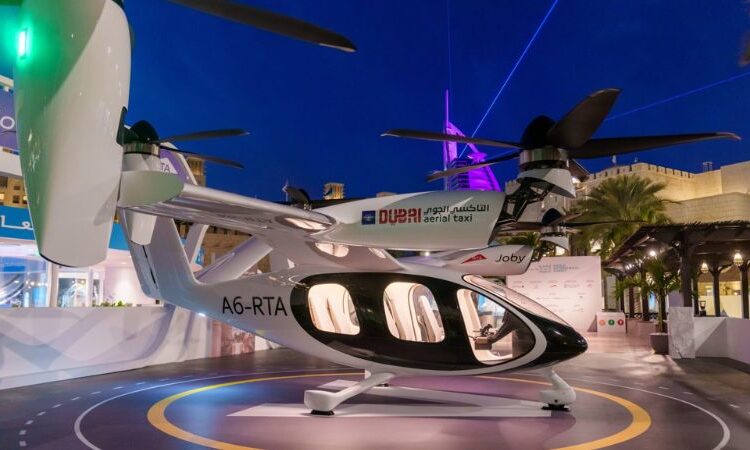
Dubai flying taxis to take off in 2026; DXB to Palm Jumeirah journeys to be slashed to just 10 minutes
Staff Writer: Skift
February 17, 2024
Flying taxis could be in the skies above Dubai by next year. The bold claim follows the signing of a new deal between local officials and a California-based transportation company.
The agreement is between Joby Aviation and Dubai’s Road and Transport Authority (RTA), which claims there could be air taxi services within the Emirate by “early 2026.”
Joby thinks initial operations could even begin next year, several months ahead of the 2026 official launch.
Joby’s air taxis look like futuristic helicopters and operate in much the same way. The vehicle takes off and lands vertically within the scope of existing helipads.
However, unlike a helicopter, it has much shorter wings with multiple small rotors. These are powered by quieter electric engines and create less vibration than current rotary aircraft.
With a top speed of 200 miles per hour and a maximum range of 150 miles, Joby’s high-tech vehicle can carry up to four passengers as well as a pilot.
What’s the New Dubai Deal?
While full details remain sketchy, Joby says the agreement includes a “variety of support” from the RTA, including “financial mechanisms, for entry and maturing of service operations in Dubai.”
Significantly, it also buys Joby valuable time to ramp up its presence in the city. The contract gives the U.S. firm exclusive rights to operate air taxis in Dubai for six years.
Joby has additionally inked a deal with infrastructure company Skyports, which will design, build, and operate the first four ‘vertiport’ sites across Dubai.
Stakeholders have agreed that Dubai International Airport, Palm Jumeirah, Dubai Marina, and Dubai Downtown will be the launch locations for the flying taxi service. For context, a journey from the city’s main airport to Palm Jumeirah is expected to take just 10 minutes, compared with 45+ minutes by car.
Competitive Threats Remain
While Joby appears to have won over authorities in Dubai, the company faces stiff competition on the global stage.
Last summer, Archer Aviation announced $215 million in new funding, with big-name backers including Boeing and United Airlines. Archer, which went public in September 2021, has now raised more than $1.1 billion. Like Joby, it is targeting 2025 as the year when flying taxis make the leap from the development lab to the downtown launchpad.
Other pioneers in the air taxi space include Lilium, which closed an additional capital raise of $192 million last year. In 2022, the German company signed an agreement with Saudi Arabia’s national flag carrier to purchase up to 100 of its vehicles. Familiar brands including Azul Airlines and NetJets have also inked early-stage deals with the firm.
Numbers on a spreadsheet can feel abstract, but there is serious money at play. Joby alone has raised more than $2 billion of funding.
Will The Dubai Project Take-Off?
You’d be forgiven for thinking this all sounds a little familiar.
In 2017, a driverless vehicle called the Autonomous Air Taxi was tested in Dubai. At the time, it was touted as the world’s first self-flying taxi service. While this laid important groundwork for subsequent developments, the program did not develop as quickly as initially hoped.
As with all pioneering technologies, progress in the sector has been peppered with pitfalls. Regulatory certification, including in the United States, has been a major issue.
To help mitigate this, Joby and the RTA have been working closely with the UAE’s General Civil Aviation Authority to give this program the greatest chance of success.
While there is no shortage of cynics, few can doubt the growing financial and technological momentum behind the new-age concepts.
Last year, Joby announced that it is investing up to $500 million to build a new facility in Dayton, Ohio, where it will mass produce its air taxis. It already has a manufacturing site in California, which opened in June 2023.
For his part, JoeBen Bevirt, the founder and CEO of Joby Aviation has highlighted “three ingredients” that he believes will make the Dubai deal a success:
- A definitive path toward operations
- The right infrastructure supported by dedicated partners
- An aircraft with the appropriate capacity and range
The larger vision shared by many air taxi aficionados is that “urban mobility” is just the beginning for electric aircraft. If the cost savings compared to existing engines are as promised, the technology could be adapted to much larger air vehicles.
As for the near term, all eyes are on Dubai. If Joby and its partners can pull off a genuinely impactful 2026 launch, it will propel the company and the Emirate to the forefront of any upcoming air taxi revolution.